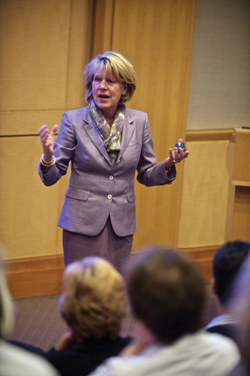Hickey Delivers Fifth Annual State of Department Address

|
| Mairead Hickey |
The “voice of the nurse” in informing decisions about practice has been crucial in shaping the practice environment in the four years since the Department of Nursing’s vision of excellent care to patients and families with the best staff in the safest environment was created.
“As a department, we are stronger and better than ever, and it is in great part because of our nurses at the bedside, our directors and leadership, who make this one of the best departments of nursing in the country,” said Mairead Hickey, PhD, RN, senior vice president of Patient Care Services and chief nursing officer. She thanked staff for their ongoing commitment to patients and families during her fifth annual State of the Department of Nursing address before a packed Bornstein Amphitheater.
“Our department grows and develops through the voices of our nurses,” she said. “This vision was key for us; it became the directional course for the work we’ve done since then, and it serves as a compass for our future.”
“Over the past five years, we have researched and described what excellent nursing practice is at BWH,” Hickey said. “And we’ve learned that a central principle of excellent nursing care is that nurses know their patients and families and that patients and families feel known and cared for by their nurses. Our work now is to reliably ensure this experience for all patients, families and nurses.” Hickey continued “We have also heard from nurses that a key support to excellent nursing practice is the presence of their director. Nurses want to feel supported and that they are part of a larger community of professionals. The nursing director creates the community at the local level by engaging all staff in dialogue about important unit and patient care issues.”
Hickey also outlined some of the changes in health care occurring on the federal, state and local level and how these changes affect BWH and nursing in particular. Nursing leaders are working with hospital leadership to adapt to the changing health care climate reflected in changes in reimbursement, in payors and in the economy overall. At BWH, changes in patient volume have resulted in decreases in some specialty areas and increases in others.
“Our strategy right now is to be thoughtful, to continue to be patient- and family-focused and to consider our patients’ needs very carefully,” Hickey said.
Hickey touched on how changes will likely affect nursing as a profession and also predicted how health care reform may offer opportunities for nurses. She indicated that academic medical centers will continue to care for very sick patients and that there would be a new focus on managing the health of communities and creating safe and coordinated care transitions across the care continuum. “We’ll get more involved with transitions of care in hand-offs to home or rehabilitation to ensure that our patients continue to be well cared for after they leave us,” she said.
“With the talents and voices of more than three thousand BWH nurses, the Department of Nursing is poised to continue advancing the practice at BWH so that individual nurses develop their practice and serve as models for nursing professionals from around the world who come here to learn,” she said. Many BWH nurses continue to make an impact on health care throughout the world as they travel to provide care to patients in need and help educate their nursing colleagues abroad.
The voices of all nurses will be critical as the Department of Nursing moves forward to meet two goals:
Develop a professional practice environment in which patients and families receive the best care, optimal outcomes are achieved and nurses can advance their practice and continue to grow professionally
Ensure that every nurse feels supported by their leaders
“We are well positioned to shape health care and nursing in the future,” Hickey said. “Your contributions are critical to the success of our department and our institution, and together, we will continue to move forward. ”